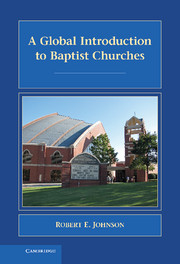Book contents
- Frontmatter
- Contents
- List of Illustrations
- Acknowledgments
- List of Important Baptist Organizations
- Global Baptist Timeline
- Introduction
- PART I FOUNDATIONS
- PART II AGE OF EMERGING BAPTIST DENOMINATIONAL TRADITIONS
- PART III THE FRONTIER AGE
- PART IV AGE OF PROLIFERATING TRADITIONING SOURCES
- PART V BELIEFS AND PRACTICES
- 9 Baptists' Beliefs and Practices
- Conclusion
- Index
- References
9 - Baptists' Beliefs and Practices
Published online by Cambridge University Press: 05 September 2012
- Frontmatter
- Contents
- List of Illustrations
- Acknowledgments
- List of Important Baptist Organizations
- Global Baptist Timeline
- Introduction
- PART I FOUNDATIONS
- PART II AGE OF EMERGING BAPTIST DENOMINATIONAL TRADITIONS
- PART III THE FRONTIER AGE
- PART IV AGE OF PROLIFERATING TRADITIONING SOURCES
- PART V BELIEFS AND PRACTICES
- 9 Baptists' Beliefs and Practices
- Conclusion
- Index
- References
Summary
Helen Barrett Montgomery shared numerous core values and beliefs with many other Baptists of her day. She shared their belief that the Bible was an authoritative revelation of God's truth, faith in Jesus as the Christ and her Savior and spiritual guide through life, confidence in the mission and methods of Baptist churches for engaging God's work in the world, and conviction that God calls faithful believers to act on those beliefs by living sacrificially for the sake of persons in need. The same convictions that united her with many fellow Baptists also distinguished her from some other Baptists and even alienated her from still others. Her belief in the Bible's superior authority would not allow her to elevate any human authority above that of Scripture. She was convinced that the Bible, when properly understood, gave women the same human freedom of being as men, and therefore the full potential for participation, decision making, and leadership. Some Baptists viewed her as a woman who had stepped out of her place. For them, Montgomery's beliefs and actions were unbecoming of feminine piety, and therefore certainly not biblical or Baptist. However, Baptist ecclesiology gave them no power to silence her or to exclude her from the Baptist fold. Purveyors of a particular theological intentionality could use their influence to convince their particular Baptist communities to exclude her and keep her from speaking at their gatherings, but other Baptist communities were free to give her a public voice and advocate her views as authentically biblical and Baptist.
Helen Barrett Montgomery illustrates the challenge of declaring almost any statement of belief and practice as the Baptist position. Statements can be associated with particular communities of Baptists at specific times in history, but almost every statement would either be challenged by or nuanced differently by some other body of Baptists. The best we can do is talk about certain tendencies in Baptist belief and polity. But, although Baptists are usually people of strong faith convictions, they are also adamantly insistent that no other authority or spokesperson preempt their own consciences. When elevated to a global scale, responsible freedom of conscience exercised in Christian community and informed through personal relationship with God by faith in Christ through the illumining power of the Holy Spirit and guided by the Bible's revelation would be the closest statement possible of what Baptists believe. This chapter seeks to offer intelligent discourse on what that means.
- Type
- Chapter
- Information
- A Global Introduction to Baptist Churches , pp. 387 - 427Publisher: Cambridge University PressPrint publication year: 2010

